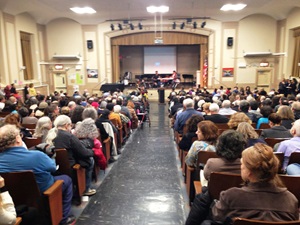When scientists talk about public policy, they usually focus on the most visible parts of the political process—think presidential speeches and Congressional debates over major legislation. But a great deal of policymaking is done quietly by professional staff at public agencies. While laws provide the broad outlines of how things are supposed to be done, it’s often up to scientific and policy staff at agencies to lay out the specifics, including whether or not a drug is brought to market, the level of ozone pollution allowed in a region, or exactly how much future sea-level rise to anticipate for new infrastructure projects.
Policy experts say well-placed scientific advice can have an outsize impact in these venues.
Becoming a trusted advisor

Normally, when state and federal agencies work to implement a law, they first introduce drafts of new rules for external review. Scientists, regulated industries, and public interest groups can weigh in with public comments—essentially letters to regulators—as well as by attending public hearings, where anyone can offer feedback about a rule. Agency staff members are then tasked with responding to every unique point brought up in public comments. Particularly controversial rules can attract thousands of comments.
Wendy Wagner, a University of Texas at Austin law professor who has studied regulatory agencies, says there’s naturally more going on behind the scenes. “There's this happy idea of comments and deliberations,” she says, “but it's probably missing how the game is being played now.”
Generally, regulated industries are able to bring considerable resources—time, expertise, and legal advice—to the table, according to Wagner’s research, while public interest groups tend to be outnumbered. Amidst their arguments about how to shape the rules, public agencies need to make sure they get their science right. Using the wrong information or failing to cite relevant science can open up the possibility of lawsuits down the road, Wagner says.
Wagner recommends that independent scientists consider “getting in at the ground level” and become a resource to agency staff who are dealing with rules on which they have relevant expertise. For instance, a scientist with some insights into wetland restoration could seek out public land managers, coastal commission staff, and other government employees who can use an independent source of information and scientific advice. Finding the right staff to reach out to is usually just a matter of looking up the office that’s dealing with a particular rule on an agency website and seeing who’s been writing reports and doing analysis on behalf of the agency.
“Agencies are scared of facts that contradict them,” Wagner says, and they’re eager to get the science right. In some cases, when agencies are under political pressure to ignore or downplay evidence, scientists can support agency staff by making it clear what can and can’t be said about the scientific realities in their field.
“Even in this world of expertise being maybe frowned upon by the general public, that's not the case in Congress and agencies,” she says.
Serving on panels and advisory bodies
Gretchen Goldman, the research director for the Center for Science and Democracy at the Union of Concerned Scientists, says volunteering on advisory committees can also be a constructive way to put one’s expertise to work.
In many cases, agencies specifically seek out subject matter experts to serve on advisory bodies. But scientists can also do more to step up and serve. For instance, the Food and Drug Administration often needs independent experts to serve on drug approval panels. But most scientists who work on prescription drugs have done business with drug companies, so it can be hard for the agency to find a group of scientists who don’t have too many possible conflicts of interest. That’s why Goldman and her colleagues asked scientists with relevant expertise in medicine and biology to serve on those panels, too, even though drug approval processes weren’t something they’d followed closely before.
Scientists are quick studies and scientific training can prepare someone well for thinking about public policy, Goldman says. She often tells scientists, “You’re more of an expert than you think you are. You don’t need to know every small detail to have something constructive to say about it.”
Goldman, an environmental engineer by training, also chairs a local public advisory committee for air and climate in the Washington, DC, region. Through the committee, she and her neighbors have helped shape how agencies account for local global warming emissions, developed a partnership with local groups to issue air quality alerts for the region, and utilized an environmental justice toolkit for evaluating new projects and policies.
Goldman urges scientists to plug into the work advocates and journalists are doing to track rules and regulations. That can mean joining a group’s email list, following policy experts on Twitter, and contacting nonprofit groups to get some guidance on how to make the best use of one’s time.
“Often there’s a lot happening right around you, you’re just not in the circles to know about it,” she says.
Aaron Huertas is an independent science communicator who lives and works in Washington, DC. He runs ScienceCommunicationMedia.com and serves as co-boss for Nerd Nite DC. He worked at the Union of Concerned Scientists for several years.
Photo:
One way scientists can weigh in on policy is to attend public hearings, such as the one pictured above from a 2016 public hearing concerning the possible loss of a supermarket in Hudson Heights, Manhattan. (Photo courtesy of Wikimedia Commons)